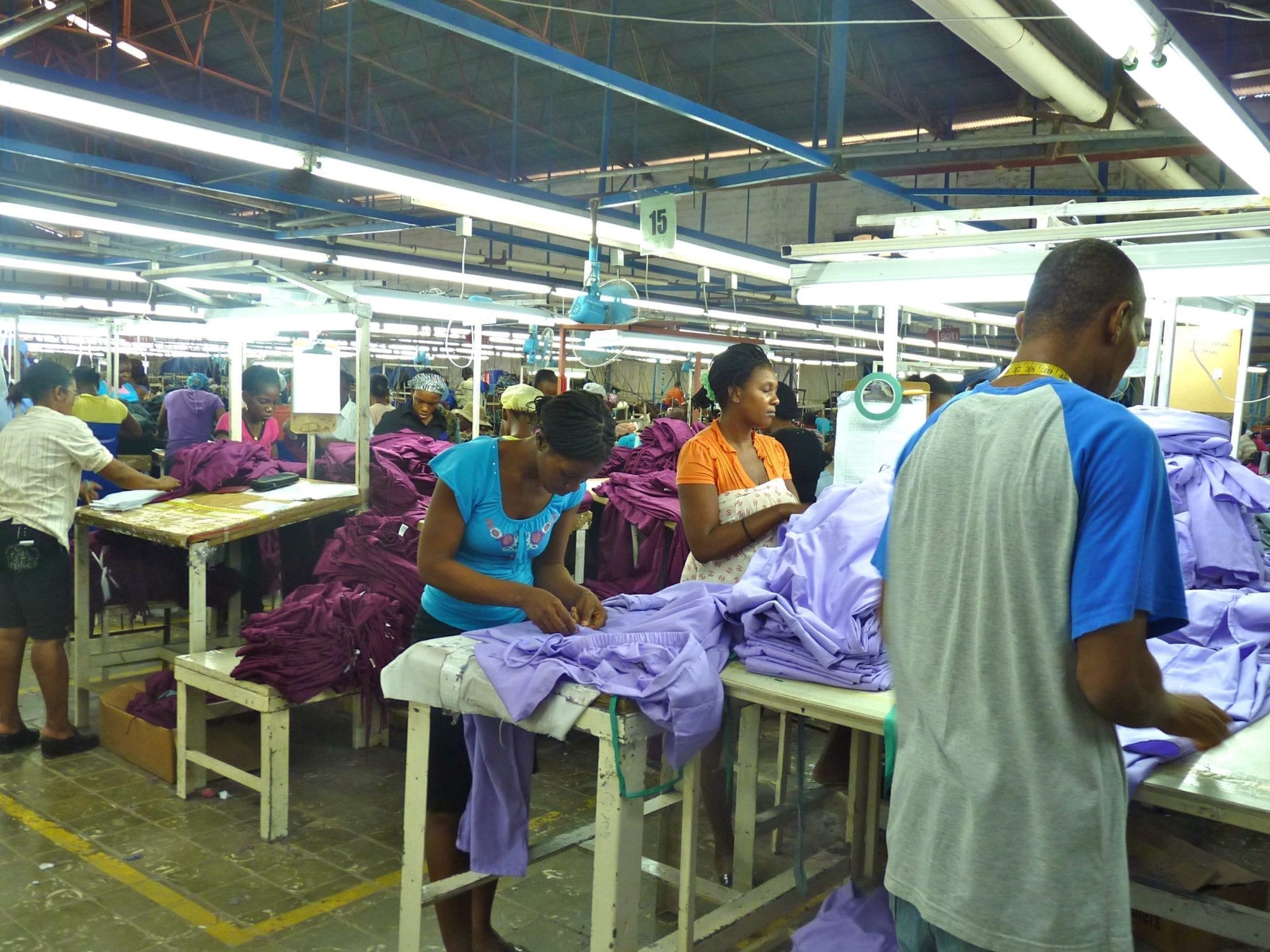
Jan 11, 2016
Six years after a major earthquake devastated the Haitian capital and its environs and the international community promised to “build back better,” Haitian workers say their daily lives are a struggle for survival, with their meager wages insufficient to cover basic expenses.
In recent interviews, Haitian garment workers told the Solidarity Center that they are worse off today than before the quake. With prices rising and wages largely stagnant, their paychecks do not allow them to support themselves and their families.
“We spend almost our entire daily wage on food and transportation,” said one garment worker interviewed. “We cannot save any money and we do not have enough money to get health care or education. Our future is compromised.”
Another worker said he sometimes has to borrow money to “make sure that at least the family has something to eat.”
Haiti is the poorest country in the Western Hemisphere and one of the poorest in the world. According to the World Bank, more than 6 million of Haiti’s 10.4 million people (59 percent) live under the poverty line.
Haitian garment workers hold rare full-time jobs in an economy that is largely informal, and work for profitable multinational manufacturers, some incentivized to come to Haiti and create jobs after the quake. Yet garment-sector wages are legally set below the national minimum wage and well below what is necessary to cover basic costs. A December 2015 Solidarity Center analysis of living expenses found that the average garment worker spends 160–225 Haitian gourdes ($2.80 – $3.94) a day on food and transportation for herself, and another 395 gourdes ($6.91) on food for the household. The current minimum daily wage for garment workers, who work 48 hours a week, is 225–240 gourdes ($3.94–$4.20). The minimum wage is supposed to increase this spring, to $5.11 for an eight-hour shift.
In 2013, Haitian workers and their unions waged rallies and protests to demand that the daily minimum wage be increased to 500 gourdes ($8.75) for export apparel workers. The government set the wage at less than half of that. In 2014, the Solidarity Center found that a living wage of 1,000 gourdes per day would allow workers to meet their basic needs.
“As we mark this grim anniversary, we have to ask why the people best-positioned to revive the Haitian economy—hardworking Haitians—are handicapped by abysmal and degrading wages. Until Haitians can earn a living that allows them to do more than barely survive, there will be no real recovery,” said Shawna Bader-Blau, executive director of the Solidarity Center. “The international community and Haitian government should be ashamed of policies that guarantee poverty wages and grant concessions to multinational corporations instead of providing real opportunities for Haitians workers to improve their lives and livelihoods and build a better country for themselves and their children.”
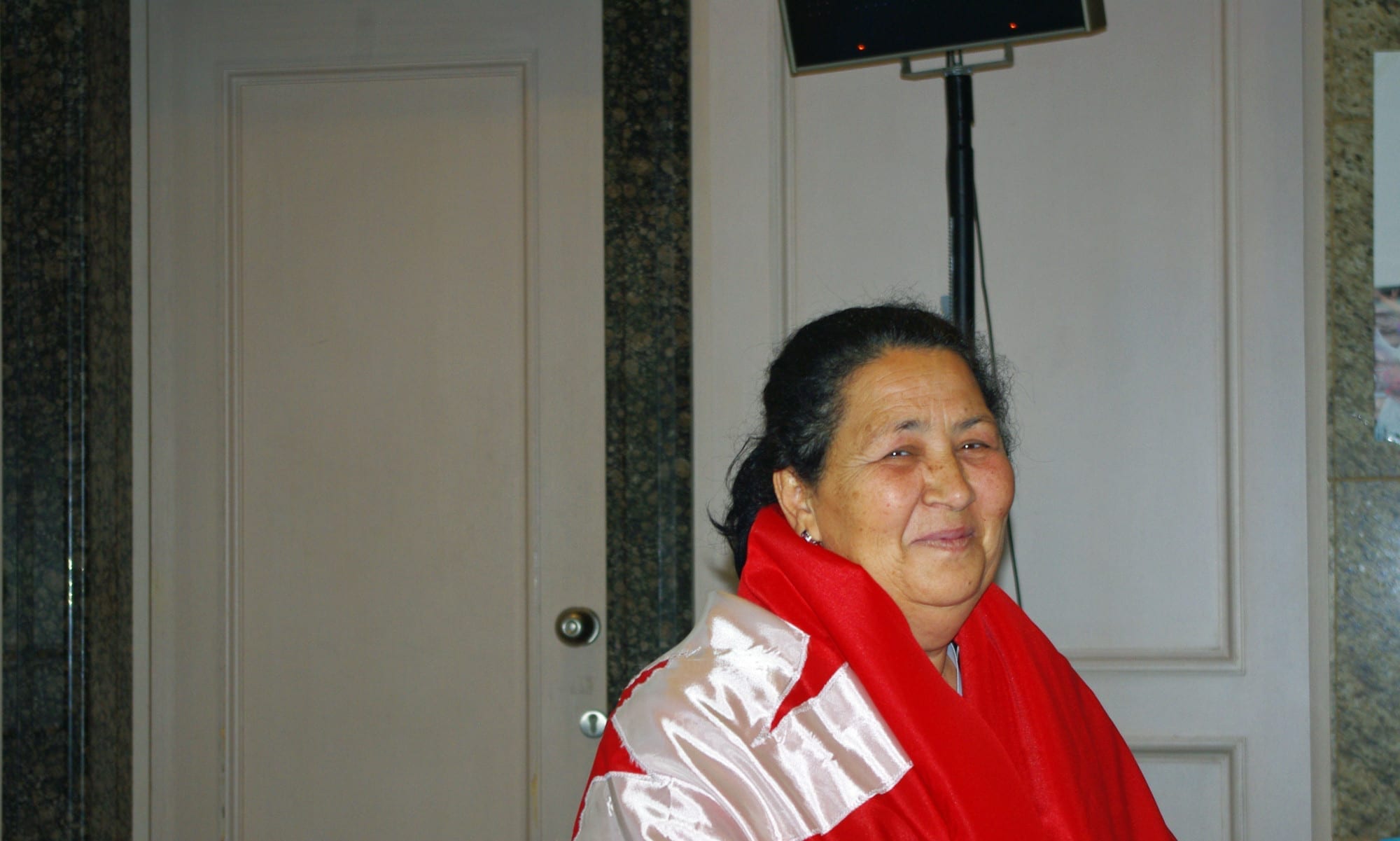
Jan 6, 2016
As a young union activist in Tunisia’s railway industry, Kalthoum Barkallah was not convinced that there was a need to work for gender equality. After all, she thought, unions did not distinguish between male and female workers. But one day when she pointed out that access to day care should be among the demands unions include in their efforts to improve worker rights, a union colleague told her it was out of order to address such an issue with management.
“This incident made me realize that there are problems specific to women and only women can understand and defend. This incident pushed me to join the women’s committee and I was elected at the national level, to defend their cause and their rights,” says Barkallah.
Now a Tunis-based Solidarity Center senior program officer and master trainer, Barkallah has not stopped championing the rights of women workers since that day back in the 1980s.
The First Step: Developing Confidence
As a trainer in gender equality, Barkallah has conducted workshops in nearly one dozen countries, including Morocco, Algeria, England and France. Frequently, the first barrier she must overcome is enabling women to get past their fears. “Often, women participants do not have enough confidence to start talking, to express themselves,” she says.
Barkallah says it is important that both women and men take part in the gender equality trainings, which begin by differentiating between the terms “sex” and “gender.”
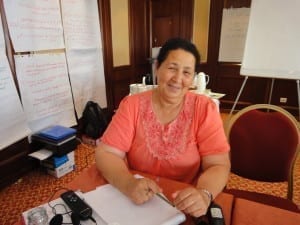
Unions “stand for liberty and democracy” and are especially important for women, says Barkallah. Credit: Solidarity Center/Imane Zaghloul
“We explain that gender is determined by society, by community, and the meaning of gender changes from one society to another,” says Barkallah. “Sex is something we are born with. We explain to women there is no reason there should not be equality between men and women, and they have to challenge their male colleagues to achieve equality and justice for all.”
Aida Sbai participated in one such training. It “strengthened my capacity and gave me confidence in myself as a woman activist with the right and the capacity to hold leadership positions with men to defend the cause of working women,” she said.
Sbai, a union member in the food and tourism sector and coordinator of the Women’s Department in the Federation of Food and Tourism Workers of Tunisia (FGAT), says, “Thanks to this training, I was able to convince workers in my sector (tourism) to join the union and to stand for union election.
“I also campaigned next to men to elect women, and the result we have today is that many women are now union leaders with the federation (FGAT).”
Ultimate Goal: Changing Conditions for Women
Numerous women who have participated in these workshops have gone on to take leading roles in their unions—one is member of her union’s executive committee in Tunisia, as is another woman in Jordan, Barkallah says. Such accomplishments fulfill what she sees as the trainings’ short-term objectives: to enable a woman to “be a citizen who is engaged in the social, political and economic life of the country and have confidence in herself.”
Ultimately, says Barkallah, “the goal is to change the conditions of work for women, to establish social justice and democracy between men and women.”
Barkallah says her union experience has reinforced the cultural, political and economic convictions she developed through the influence of her father, an active trade unionist, and by her participation as a university student in the struggle for democracy in the mid-1970s.
She sees unions as particularly important for women because a union is a “unique organization that defends the civil society, economy, society and the political rights of women. It allows women to be liberated and emancipated, opens horizons at the national and international levels, and allows her to change her conditions. Unions stand for liberty and democracy.”
‘Change Comes with Women and Nothing Can Stop Them’
As an activist with the Tunisian General Federation of Railways, Barkallah was first elected deputy general secretary in 2000, heading up training within the union. She later was elected deputy general secretary in charge of international relations and, in 2006, elected president of the International Transport Workers’ Federation (ITF)–Arab Women’s committee. Barkallah has been an active union leader with Tunisia’s union federation, the Union Générale Tunisienne du Travail (UGTT). Throughout, she balanced both work and family duties, raising two sons who each now have their own children.
Barkallah says the most moving experience in her 25 years of activism revolves around the success women achieved after the 2011 uprising. Tunisian women first helped spur protests and end autocratic regimes in Tunisia and throughout the Arabic-speaking world and then organized a democratic coalition to successfully defeat a proposed change to Tunisia’s constitution that would have reduced the legal status of women.
“Women built alliances with civil society, labor organizations, and we were able to change the law. I found this experience really moving. Women can change their situation—and that change comes with women and nothing can stop them.”
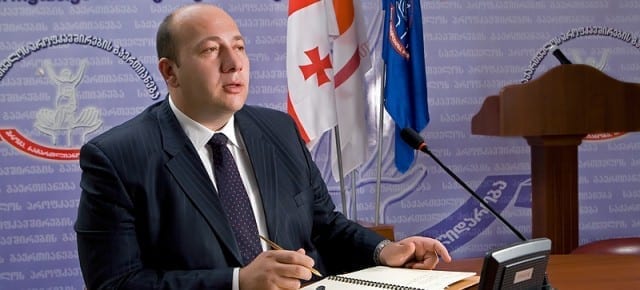
Dec 18, 2015
Irakli Petriashvili, president of the Georgian Trade Union Confederation, a Solidarity Center partner, was elected president of the Pan-European Regional Council (PERC) this week in Brussels, Belgium.
Describing the persistence of Georgian union members in championing worker rights during a politically difficult time over the past 10 years, Petriashvili said only strong unity “could stand the pressure of the radical anti-union regime.” Georgian union members’ “uncompromised persistence and firmness encouraged by the (European Trade Union Confederation) ETUC’s and PERC’s leaders’ and its affiliates’ coordinated and unwavering support,” he said.
“This makes me fully confident that once we could win this battle in Georgia, the victory can be repeated in any country and also internationally.”
More than 120 participants from around Europe took part in the third general assembly of PERC, an organization of the International Trade Union Confederation (ITUC). PERC members also expanded the leadership team, a move Petriashvili supported.
“It is important that existing union diversity is turned into our advantage for deepening democratic development of labor movements across the region,” he said. “For this purpose, it will be a right decision to have more vice-presidents of the PERC as this will increase the interest and the level of involvement of different unions into PERC’s matters.”
Petriashvili was elected president of the GTUC in 2005 and began the democratization of the union movement. Before leading the GTUC, he headed up a union at the Tbilisi-based energy distribution company Telasi. Under his leadership, the union became a more vocal advocate for its members’ interests, and he even led a groundbreaking hunger strike that resulted in a contract that bolstered worker rights. In 1999, Petriashvili attended a course for young trade unionists, organized jointly by the Solidarity Center, the AFL-CIO and the International Labor Organization.
Earlier this year, the Solidarity Center launched a new project in Georgia focused on improving worker occupational safety and health and training workers in negotiating contracts and broadening unions’ ability to promote effective
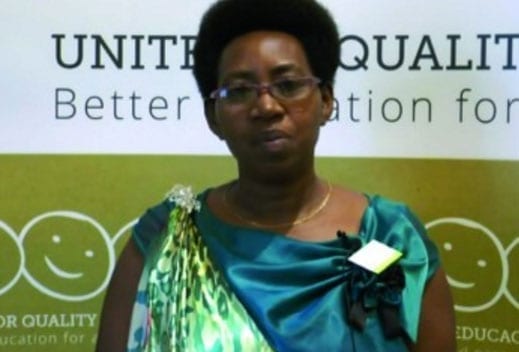
Dec 18, 2015
Hundreds of union leaders and members, including at least 250 teachers, have fled Burundi while dozens more have been jailed, as the east African country roils in widespread violence. In October, a journalist and his family were shot dead at their home by security forces, according to the International Federation of Journalists. Broadcast media workers also were attacked with heavy weapons in May.
“I was part of a teacher’s union and because I was helping teachers fight for their rights, I was seen as an opponent,” according to one teacher, now in internal exile in the country’s Makamba Province. “A friend in the police told me that I was on the ‘list’ to be arrested so I had to flee.”
The refugee’s story is among those collected in a Refugee International report which found that Burundians were threatened by police due to their membership in civil society organizations perceived not to be supportive of the government, such as human rights organizations and unions.
Unions and their members also are being targeted in other ways. For instance, the Syndicat des Travailleurs de l’Enseignement du Burundi (STEB), which represents teachers, reports that its bank account was ordered closed last week.
Over the weekend, 87 people were killed. Since April, some 220,000 people have fled Burundi and 15,000 people have been displaced within the country. The violence stems from protests that began after President Pierre Nkurunziza decided to run for a third term.
The United Nations Human Rights Council approved a resolution yesterday calling for the quick deployment of experts to Burundi to look into abuses amid the growing violence. The UN high commissioner for human rights has called on Burundi’s leaders to disarm pro-government militias, halt torture and resume political dialogue, saying that sanctions, asset freezes and travel bans should be imposed on those responsible for abuses.
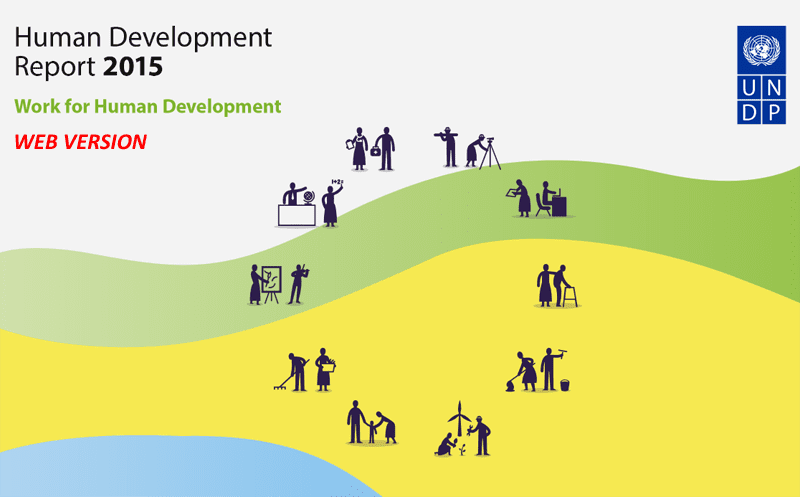
Dec 14, 2015
Equitable and decent work for all and strategies such as promoting collective action, trade unionism and other worker rights are essential to achieve worker well-being, according to a report by the United Nations Development Program (UNDP) released today.
“People are the real wealth of nations, and human development focuses on enlarging people’s choices,” according to the 2015: Work for Human Development report, which notes that rapid technological progress, deepening globalization, aging societies and environmental challenges are rapidly transforming what work means today and how it is performed.
On the positive side, the report finds that between 1990 and 2015, the number of people in extreme poverty worldwide fell from 1.9 billion to 836 million and significant strides were made in reducing child mortality and improving access to drinking water and sanitation, even as the world’s population rose from 5.3 billion to 7.3 billion.
Yet in 2012, some 21 million people worldwide were in forced labor, trafficked for labor and sexual exploitation or held in slavery-like conditions, the majority of whom are women and girls, according to the report. Forced labor is thought to generate around $150 billion a year in illegal profits.
Further, key findings also include:
- Some 80 percent of the world’s people have only 6 percent of the world’s wealth. The share of the richest 1 percent is likely to be more than 50 percent by 2016.
- Wages lag behind productivity, and workers’ shares in income have been falling.
- Women are disadvantaged in both paid and unpaid work.
Income Inequality, Gender Inequality ‘Not Sustainable’
“Inequality is the developmental, political and social challenge of our time. Inequality is an issue of democracy,” said Selim Jahan, director of the UNDP’s Human Development Report Office. “When 1 percent of the people own 48 percent of the world’s wealth, that’s not sustainable, Jahan said, speaking earlier this year at a Labor and Employment Relations Association meeting in Washington, D.C.
Given that millions of workers support their families by cleaning homes, selling goods in outdoor markets and hire on as day laborers, Jahan also asked whether “we need a new social contract, one that includes informal-sector workers.”
The report’s findings on women are especially scathing. Although women account for the majority of global work—contributing 52 percent compared with 48 percent for men—women earned 24 percent less than men, the report finds. Further, women carry out three of every four hours of unpaid work. In contrast, men account for two of every three hours of paid work.
“Women’s employment is not an abstract question,” said Jahan. “It has implications for the community.”
Enlarging child care options, enhancing maternal and paternal leave policies and legislative action to reduce inequalities between women and men in the workplace are some of the report’s recommendations for balancing care and paid work, making work sustainable and addressing youth unemployment.
The report, accessible in multiple languages, also for the first time is available in an interactive online version.






